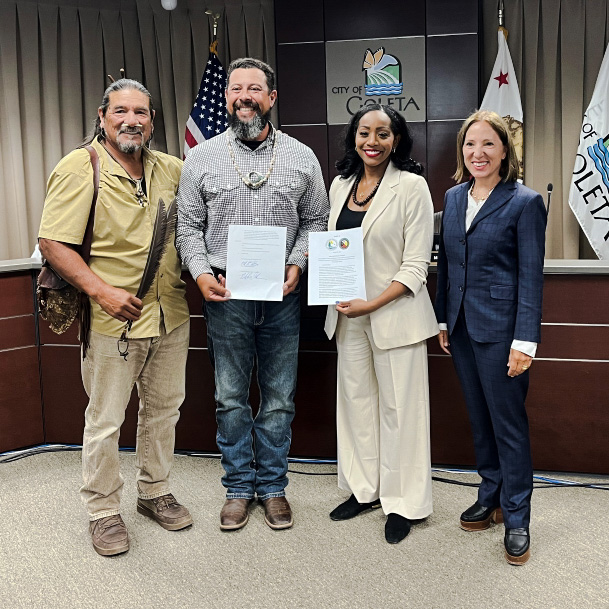Commissioners:
Malia M. Cohen, California State Controller, Chair
Eleni Kounalakis, Lieutenant Governor, Member
Joe Stephenshaw, Director of the Department of Finance, Member
Media Contact:
Sheri Pemberton, Chief of External Affairs
916.477.0691 | Sheri.Pemberton@slc.ca.gov
For Immediate Release: August 29, 2024
The Commission also certified an Environmental Impact Report and authorized the Rincon Oil and Gas Decommissioning Project.
SANTA BARBARA – Today, the California State Lands Commission and the Coastal Band of the Chumash Nation announced a commitment to pursue a co-management framework for land formerly used for offshore oil and gas development. This first-of-its-kind agreement memorializes the Commission’s intent to partner with the Coastal Band of the Chumash Nation to support shared land stewardship and California’s commitment to conserve 30 percent of the state’s lands and coastal waters by 2030 (known as the 30×30 initiative). The Commission also certified an Environmental Impact Report and authorized a project to decommission the oil and gas facilities.
“Today is an exciting day,” said State Controller and Commission Chair Malia M. Cohen. “This commitment to pursue a co-management agreement is the first of its kind and will deliver numerous benefits through conservation solutions that will uplift the Coastal Band’s knowledge of their own land. It’s an important step toward restoring the connection between the Chumash people and the land they have always inhabited.”
Rincon Island in Ventura County sits a half mile out from one of California’s most beautiful coastlines and, until 2008, was home to a working oil and gas operation. A causeway that arcs over the ocean connects the island to the shore. The agreement signed today memorializes the intent and commitment to partner on a framework and agreement to co-manage and co-steward Rincon Island and a 6-acre onshore parcel along Pacific Coast Highway that was part of the former oil and gas operations.
“We are meeting the moment and actually putting tribal co-management into practice,” said Lieutenant Governor and Commissioner Eleni Kounalakis. “This is our first time committing to work collaboratively toward a co-management framework, honoring the vital role that Native American tribes have played in stewarding these lands for thousands of years. I look forward to many more such partnerships as we work together to safeguard our state’s precious lands and waters for generations to come.”
The Coastal Band of the Chumash Nation is a sovereign nation of Coastal Chumash Indigenous Peoples who have lived and stewarded the land currently known as San Luis Obispo, Santa Barbara, Ventura, Los Angeles, and Kern counties for tens of thousands of years. Co-management offers an opportunity to repurpose the land, provide space for tribal members to carry out their cultural practices, and expand public education about Native American tribes. The next steps following today’s action are to secure funding and permits to decommission and remediate the land and develop a co-management framework.
“Having an opportunity to access our sacred lands supports our efforts of cultural revitalization, restores our historical practices, and reinforces our tribal sustainability and sovereignty,” said Coastal Band of the Chumash Nation Chair Gabriel Frausto. “It is an honor to continue to work with state and local agencies on this endeavor, creating a model of community for future generations.”
About the Commission: The Commission manages over 4 million acres of tide and submerged lands and the beds of navigable waterways. The Commission’s Tribal Consultation Policy provides guidance on pursuing restorative justice with Tribes through natural resource stewardship. The Commission is a leader in protecting tribal resources, having returned 40 acres of land in Inyo County to the Lone Pine Paiute-Shoshone Reservation to preserve and protect tribal cultural resources.
About the Chumash Nation: The Chumash Indigenous Peoples have resided on 7,000 square miles of land between Malibu to Paso Robles for tens of thousands of years. The Coastal Band operates in a nonprofit structure to deliver tribal and sustainability programming for the Coastal Chumash Indigenous Peoples. The Coastal Band is comprised of over 2,000 individuals who spearhead the restoration and protection of their sacred lands and resources.

Left to Right: Tribal Council Elder Representative Mati Waiya, Chairman Gabriel Frausto, Malia M. Cohen, California State Controller and Commission Chair, and Eleni Kounalakis, Lieutenant Governor and Commissioner

